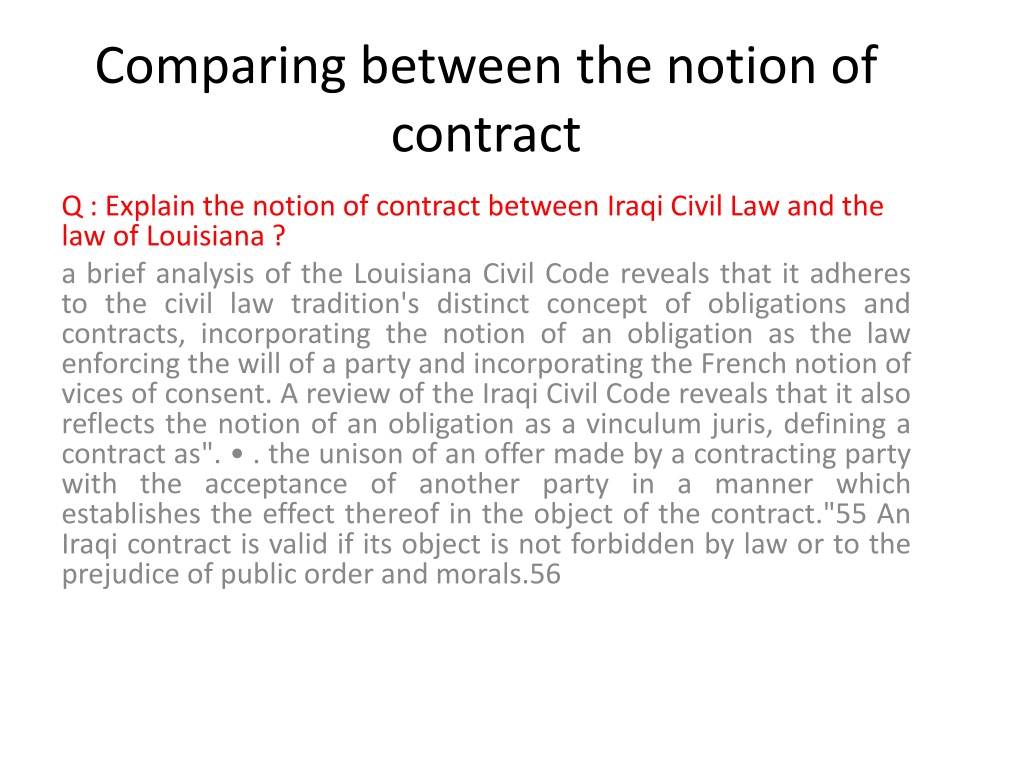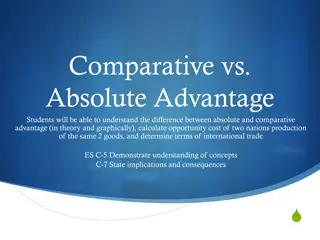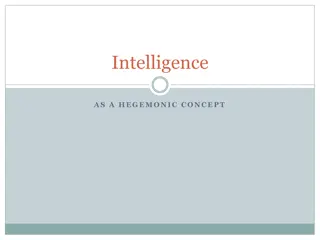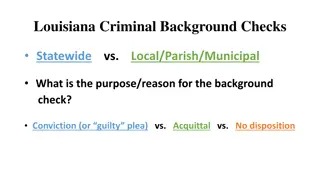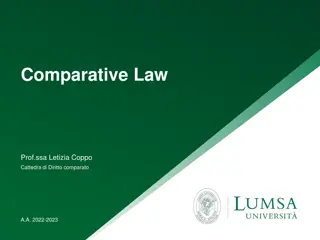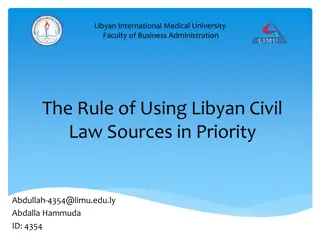Comparative Analysis of Contract Notions in Iraqi Civil Law and Louisiana Law
Iraqi Civil Law and Louisiana Law both outline the notion of contract, emphasizing obligations and consent. The Iraqi Civil Code defines a contract as a unison of offer and acceptance, while the Louisiana Civil Code incorporates French principles of vices of consent. Both legal systems require valid contracts to adhere to legal and moral standards, with provisions on nullity for contracts lacking cause or violating public order. Consent can be invalidated by duress, mistake, or fraudulent misrepresentation in both legal frameworks. Additionally, both laws emphasize performance as an essential aspect of contractual obligations.
Download Presentation

Please find below an Image/Link to download the presentation.
The content on the website is provided AS IS for your information and personal use only. It may not be sold, licensed, or shared on other websites without obtaining consent from the author. Download presentation by click this link. If you encounter any issues during the download, it is possible that the publisher has removed the file from their server.
E N D
Presentation Transcript
Comparing between the notion of contract Q : Explain the notion of contract between Iraqi Civil Law and the law of Louisiana ? a brief analysis of the Louisiana Civil Code reveals that it adheres to the civil law tradition's distinct concept of obligations and contracts, incorporating the notion of an obligation as the law enforcing the will of a party and incorporating the French notion of vices of consent. A review of the Iraqi Civil Code reveals that it also reflects the notion of an obligation as a vinculum juris, defining a contract as". . the unison of an offer made by a contracting party with the acceptance of another party in a manner which establishes the effect thereof in the object of the contract."55 An Iraqi contract is valid if its object is not forbidden by law or to the prejudice of public order and morals.56
Comparing between the notion of contract A review of the Iraqi Civil Code reveals that it also reflects the notion of an obligation as a vinculum juris, defining a contract as". . the unison of an offer made by a contracting party with the acceptance of another party in a manner which establishes the effect thereof in the object of the contract." An Iraqi contract is valid if its object is not forbidden by law or to the prejudice of public order and morals.
Comparing between the notion of contract The Iraqi Code further states that "the contract shall be null and void if the contracting party has assumed an obligation without a cause or for a cause which is legally prohibited or is in violation of public order and morals.Thus, the Iraqi Civil Code's theory of obligations maintains the civilian concept of cause.
Comparing between the notion of contract According to the Iraqi Code, "offer and acceptance are . . . [words] used customarily for the creation of a contract; whichever expression is made first is an offer and the second is the acceptance." This is the primary method in which parties to an Iraqi contract express their consent. Likewise, the Iraqi code allows that consent may be vitiated by certain "defects of the will. These are articulated as duress,' mistake,61 and "fraudulent misrepresentation with lesion. Thus, like the Louisiana Civil Code, the Iraqi Code retains the French-developed concept of vices of consent.
Comparing between the notion of contract In addition, the Iraqi Civil Code requires that "[e]very obligation which has resulted from the contract must have [a legal] object attached to it . . . the object may be property be it an object of material value, a debt, a benefit, or any other pecuniary right; it may also be work or abstention from doing work.This last phrase mirrors the Louisiana Civil Code's definition of performance, which allows performance to "consist of giving, doing, or not doing something. '
Comparing between the notion of contract Thus, a review of the Iraqi law of obligations reveals a familiar picture for civilian jurists. Like its Creole cousin, the Iraqi Civil Code requires, for formation of a valid contract, the following basic criteria: mutual consent, object, and just cause.65 This is a traditional civilian formula that upholds the view of an obligation as a vinculum juris between two persons, with a right in a thing that can be held against the world. There is no requirement for consideration, an exchange, or for a quid pro quo.
